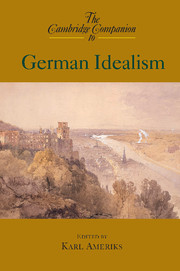Book contents
- Frontmatter
- Introduction
- 1 The Enlightenment and idealism
- 2 Absolute idealism and the rejection of Kantian dualism
- 3 Kant’s practical philosophy
- 4 The aesthetic holism of Hamann, Herder, and Schiller
- 5 All or nothing
- 6 The early philosophy of Fichte and Schelling
- 7 Hölderlin and Novalis
- 8 Hegel’s Phenomenology and Logic
- 9 Hegel’s practical philosophy
- 10 German realism
- 11 Politics and the New Mythology
- 12 German Idealism and the arts
- 13 The legacy of idealism in the philosophy of Feuerbach, Marx, and Kierkegaard
- Bibliography
- Index
7 - Hölderlin and Novalis
Published online by Cambridge University Press: 28 May 2006
- Frontmatter
- Introduction
- 1 The Enlightenment and idealism
- 2 Absolute idealism and the rejection of Kantian dualism
- 3 Kant’s practical philosophy
- 4 The aesthetic holism of Hamann, Herder, and Schiller
- 5 All or nothing
- 6 The early philosophy of Fichte and Schelling
- 7 Hölderlin and Novalis
- 8 Hegel’s Phenomenology and Logic
- 9 Hegel’s practical philosophy
- 10 German realism
- 11 Politics and the New Mythology
- 12 German Idealism and the arts
- 13 The legacy of idealism in the philosophy of Feuerbach, Marx, and Kierkegaard
- Bibliography
- Index
Summary
Introduction
In Jena in May 1795, Hölderlin and Novalis were introduced to one another in Fichte's presence by their mutual friend, Immanuel Niethammer. How unfortunate that we do not know the details of their conversation! For Hölderlin and Novalis were not simply on their way to becoming the two most important poets of Early Romanticism in Germany. They were already philosophers of great accomplishment. At this time, Hölderlin had developed a powerful critique of Fichte's philosophy, and in the following months Novalis would begin to do the same. Moreover, their thought moved in similar directions. Both charged Fichte with wrongly supposing that consciousness enjoys an immediate acquaintance with its own nature. Our subjectivity, they argued, has its basis in a dimension of “Being,” which eludes not only introspection but philosophical analysis as well. By “Being” they understood different things. But they agreed in opposing one of the leading assumptions of Fichte's and later Hegel's idealism, namely, that reality is transparent to reason. For both of them, philosophy runs up against limits that poetry alone can point beyond.
- Type
- Chapter
- Information
- The Cambridge Companion to German Idealism , pp. 141 - 160Publisher: Cambridge University PressPrint publication year: 2000
- 6
- Cited by

